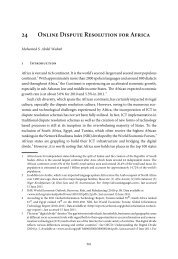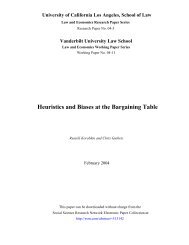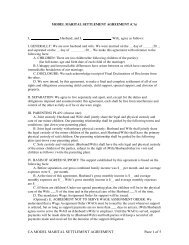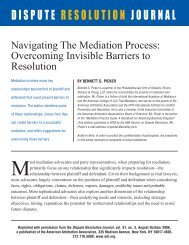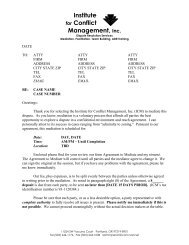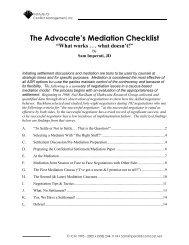17 e-Mediation - Mediate.com
17 e-Mediation - Mediate.com
17 e-Mediation - Mediate.com
Create successful ePaper yourself
Turn your PDF publications into a flip-book with our unique Google optimized e-Paper software.
Noam Ebner<br />
3.2.2 E-<strong>Mediation</strong>: Not Always First Choice<br />
Traditional ADR usually assumes a breakdown in <strong>com</strong>munication or other negotiation<br />
difficulties between parties. Coupled with a general interest-based approach, this leads to<br />
a state-of the-art in which mediation – regarded as the best <strong>com</strong>munication or negotiation<br />
fixer-upper – is viewed as the process of first choice. 25 In ODR, however, this is not the<br />
case. In many cases, negotiation difficulties are viewed as being a result of distance, of low<br />
dispute-value, or of parties not knowing how to contact each other. As a result, some ODR<br />
providers focus on using technology as a way of bringing parties into contact (and sometimes,<br />
highly structured contact) without involving a live mediator. In these cases, technology<br />
as the Fourth Party functions without a human Third Party.<br />
However, these service providers recognize that many cases fail to reach conclusion<br />
for other reasons, and that the presence or assistance of an e-mediator can be helpful.<br />
These service providers offer e-mediation, in one form or another, as an add-on process<br />
after the “primary” process of negotiation has failed. For example, eBay/PayPal’s dispute<br />
resolution process includes live mediation for parties who do not reach agreement through<br />
the automated process. SmartSettle also offers third party assistance in different forms,<br />
and Cybersettle offers “telephone facilitation” in the event that parties to a blind-bidding<br />
process to not overlap, but are judged to be sufficiently close to one another that a final<br />
nudge might help them to settle the case.<br />
It may be that a shift emphasizing technology as a <strong>com</strong>munication medium more than<br />
as a dispute resolution tool in its own self may be inherent in the emergence of an online<br />
market of individual private practitioners. A ripple of this phenomenon might be a tipping<br />
of the balance back towards human intervention as default, as opposed to automated<br />
intervention as default and human intervention as a backup.<br />
3.3 E-<strong>Mediation</strong>: Advantages and Challenges, Suitability and Conditions<br />
Whilst many scholars have provided an overview of the advantages and disadvantages of<br />
e-mediation, it seems in order to shed light on these two lists at this juncture for practical<br />
considerations pertinent to the mediatability of certain disputes arising in diverse contexts.<br />
3.3.1 Advantages of Online <strong>Mediation</strong><br />
3.3.1.1 Advantages for Parties<br />
– E-mediation is convenient. Parties choose when to participate, at least when employing<br />
asynchronous <strong>com</strong>munication; travel time and fuss is eliminated in any event.<br />
25 See F.E.A. Sander & L. Rozdeiczer, “Matching Cases and Dispute Resolution Procedures: Detailed Analysis<br />
Leading to a <strong>Mediation</strong>-Centered Approach”, Harv. Negot. L. Rev. (2006) 11.<br />
376


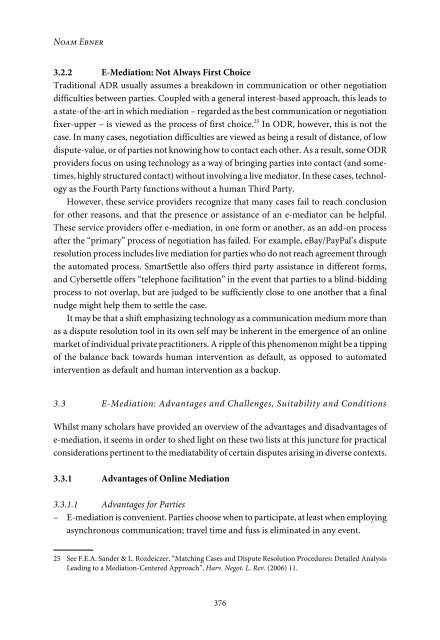
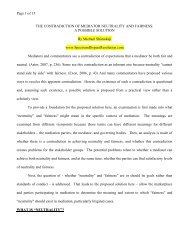

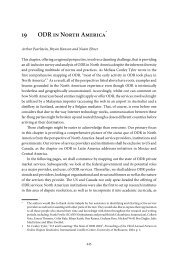
![Settlement Agreement Form [Agreement] - Mediate.com](https://img.yumpu.com/50682143/1/190x245/settlement-agreement-form-agreement-mediatecom.jpg?quality=85)

